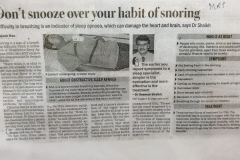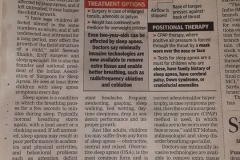Drowsy through the day? Meet your doctor


The time spent in slumberland has a profound effect on two-thirds of a person’s life. However, a sizeable number of Puneites are suffering from daytime drowsiness, implying that they aren’t sleeping well at night.
A disorder called obstructive sleep apnea syndrome (OSAS) is fast catching up among all age groups. OSAS is a potentially serious sleep disorder in which breathing repeatedly stops and starts. A person may be suffering from sleep apnea if s/he snores loudly and feels tired even after a full night’s sleep, say experts.
People working in shifts, including employees of entertainment, food and hospitality, aviation industries as well as IT and BPO professionals, are most at risk. “About 35% to 40% of newly diagnosed patients of sleep apnea are those working in shifts and following an erratic lifestyle,” said city-based sleep specialist and ENT surgeon Seemab Shaikh.
Shaikh is the national president of the Indian Association of Surgeons for Sleep Apnea, a pan-India body of doctors working in the field of sleep disorders. He sees around 800 new patients of sleep apnea in a year.
“Five years ago if I would see a patient every day, now I get to see two. The reasons for the rise are manifold. Faulty lifestyle, increasing obesity, rising stress levels and increased awareness about sleep apnea have contributed to the increase in cases,” he said.
The disrupted sleep causes drowsiness during the day and impacts performance at the workplace and personal life. “The patients mainly complain about poor quality sleep and excessive daytime sleepiness. Almost all of them have moderate to a severe breath-obstruction problem during sleep,” Shaikh shared.
A majority of these patients are from higher socio-economic strata. Most are obese and many are diabetic, hypertensive and elderly. They lead sedentary lives with poor physical activity. “In severe cases, the episode of breath obstruction is so frequent that sleep is completely destroyed or fragmented. Untreated OSAS can lead to uncontrolled blood pressure and diabetes, heart attack, strokes, even heart failure,” Shaikh said.
Senior medical expert K K Aggarwal, former national president Indian Medical Association (IMA), said, “OSAS is the most common type of sleep disorder and snoring is a noticeable sign. The low blood oxygen levels and disturbed sleep occurring due to OSA can lead to heart diseases.”
“About half the OSAS patients have high blood pressure. It is more common in men and chances of its occurrence increase with age. It could also be genetic, and people of certain ethnicities are more prone to it than others. This condition is also more common in people with a large neck circumference — greater than 17 inches for men and 15 inches for women,” Aggarwal said.
Rise in sleep-related disorders by 15-20 per cent: experts
Ahead of World Sleep Day on March 19, which has the theme 'Regular Sleep, healthy future', a consensus document has been released as a reference guide for physicians on how to practice sleep medicine during the pandemic.
During the Covid-19 induced nationwide lockdown, specialists in Pune and across the country were challenged on how to tackle sleep-related disorders and conduct sleep studies at home with experts reporting incidence of such disorders has increased by 15-20 per cent. Doctors have also attributed anxiety levels as a contributing factor due to Covid-19 pandemic-related uncertainties.
Ahead of World Sleep Day on March 19, which has the theme ‘Regular Sleep, healthy future’, a consensus document has been released as a reference guide for physicians on how to practice sleep medicine during the pandemic.
Published in the Indian Journal of Sleep Medicine, the document talks about new onset sleep disturbances, including insomnia and circadian rhythm disorders, which have been reported in this period. Severe Covid-19 disease and obstructive sleep apnea (OSA) may have shared risk factors, including advancing age, systemic hypertension and cardiovascular disease, the document states.
Dr Seemab Shaikh, founder president of the Indian Association of Surgeons for Sleep Apnea and one of the authors of the document, said the incidence of sleep disorders has increased by 15 to 20 percent. “Pre-Covid on a daily basis there were four to five consultations. Due to the lockdown, we started teleconsultations and there were at least eight to ten inquires with more cases once OPDs commenced,” Shaikh, who is also a consulting ENT and sleep specialist, told The Indian Express on Friday.
OSA is a sleep disorder where a person’s breathing stops involuntarily due to over relaxation of throat muscles. Such pauses in breath occur multiple times throughout the night, leading to disrupted and poor sleep.
Globally, OSA is on the rise and according to several studies, there is a steady increase in the number of people in India who suffer from this sleep disorder.
Experts to conduct a study on sleep apnea across India
World Sleep Day is held on March 15 to raise awareness about sleep as a human privilege that is often compromised by modern lifestyle habits.

The Indian Association of Surgeons of Sleep Apnea will undertake a pan-India study of sleep apnea to record the incidence of the disorder in the general population.
“We are not screening the population, which is already facing this problem. We want to get a sense of how acute it is in the general population,” said Dr. Seemab Shaikh, founder national president of the Indian Association of Surgeons of Sleep Apnea, which is preparing a questionnaire to record authentic data about the disorder.
World Sleep Day is held on March 15 to raise awareness about sleep as a human privilege that is often compromised by modern lifestyle habits.
“There is a need to reduce the burden of sleep problems in society through better prevention and management of sleep disorders,” said Shaikh, adding, “The seriousness of the problem can also be gauged when marriage counselors often refer couples to our clinics for treatment for snoring. It impacts the overall health of the person and sleeps deprivation when one partner is snoring and can lead to irritability.”
What is sleep coaching and do you need to try it?
27 FEBRUARY 2020
If tossing and turning in bed is bringing you down, getting professional help might help you get down to the crux of the problem.
A good night’s sleep has been proven to solve every problem—it helps you concentrate better, work out harder at the gym, perform tasks faster, improve your metabolism and bolster your immunity. But with the amount of distractions on deck—like the constant scrolling and flipping through channels—it can be hard to actually find. For some people, eating the wrong food at night or snoring can come in the way of restful sleep, while for others, a too-warm sleep environment or a too-bright room can be the culprit. If you’re not able to pinpoint what your actual sleep issue is, a sleep coach might be able to help. Do you need one? How does it work? We spoke to the experts to find out.
What are the dangers of sleep deprivation?
“Sleep deprivation, whether it is due to lifestyle or medical issues, can cause serious physiological and psychological issues that affect your day-to-day lives and interpersonal relationships,” says Pune-based Dr Seemab Shaikh, the founder and national president of the Indian Association of Surgeons for Sleep Apnea. A sleep surgeon and ENT as well, Dr Shaikh says that most people are unsure what their reason for a bad night’s sleep is, and simple diagnostic tests could go a long way. In fact, as shown in a recent survey, 8 in 10 adults wish they could sleep better, but most people (60 per cent) said that they had never taken steps to actually improve the quality of their sleep, or think that they have a problem on their hands. “I see a lot of patients who think that snoring is actually a sign of a good, deep sleep. A doctor will tell you that that is not the case, and stopping it when it starts is a good way to make sure it doesn’t keep affecting you,” confirms Shaikh.
How can sleep coaching help?
“Snoring, for example, means that there is a blockage in your air passage that is causing an obstruction as you sleep,” says Dr Reji Paul, consultant neurologist, Aster Medcity. This can spiral. “When you have slept for ten hours and do not wake up fresh, it means that your body is oxygen deprived, which is because of the narrowed air pipe due to snoring,” confirms Dr Shaikh. “This means digestion, muscle action, your blood pressure, and heart health are affected. Repeatedly low oxygenation to the brain will affect your neurocognitive functioning. This manifests as early morning headaches, lethargy, loss in concentration, irritability and temperamental issues.” While most sleep disorders simply get classified as insomnia, Dr Paul is quick to suggest that it might be something more at play. “As part of the sleep study, we first check the clinical history of the patient. A camera examination of the airway will help locate the blockage and not everyone needs to undergo a minimally invasive medical procedure or even an overnight sleep study as the issue can often be solved by changing your habits,” says Paul.
Sleep coaches and doctors can also help weaning patients off of sleeping medications, creating natural environments that might be more conducive to good rest. At centres like the Shaditya Hospital in Chennai and the Dr A.B.R ENT Clinic in Mumbai, overnight sleep studies can be done to track sleeping patterns and course-correct any issues. If medical problems are ruled out, lifestyle changes can be fixed in the same way. Extremely popular in the US and Europe, online sleep coaches (Like Insomnia Coach) can help track issues by having clients fill in sleep diaries. Not ready to work with a doctor yet? Apps like Sleep Cycle, Pillow and Sleepscore can help keep you accountable.





